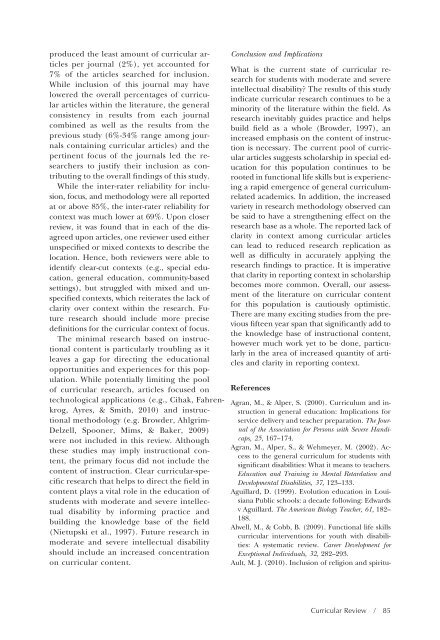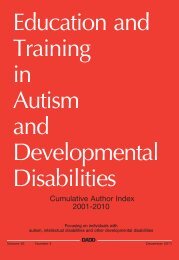etadd_48(1) - Division on Autism and Developmental Disabilities
etadd_48(1) - Division on Autism and Developmental Disabilities
etadd_48(1) - Division on Autism and Developmental Disabilities
Create successful ePaper yourself
Turn your PDF publications into a flip-book with our unique Google optimized e-Paper software.
produced the least amount of curricular articles<br />
per journal (2%), yet accounted for<br />
7% of the articles searched for inclusi<strong>on</strong>.<br />
While inclusi<strong>on</strong> of this journal may have<br />
lowered the overall percentages of curricular<br />
articles within the literature, the general<br />
c<strong>on</strong>sistency in results from each journal<br />
combined as well as the results from the<br />
previous study (6%-34% range am<strong>on</strong>g journals<br />
c<strong>on</strong>taining curricular articles) <strong>and</strong> the<br />
pertinent focus of the journals led the researchers<br />
to justify their inclusi<strong>on</strong> as c<strong>on</strong>tributing<br />
to the overall findings of this study.<br />
While the inter-rater reliability for inclusi<strong>on</strong>,<br />
focus, <strong>and</strong> methodology were all reported<br />
at or above 85%, the inter-rater reliability for<br />
c<strong>on</strong>text was much lower at 69%. Up<strong>on</strong> closer<br />
review, it was found that in each of the disagreed<br />
up<strong>on</strong> articles, <strong>on</strong>e reviewer used either<br />
unspecified or mixed c<strong>on</strong>texts to describe the<br />
locati<strong>on</strong>. Hence, both reviewers were able to<br />
identify clear-cut c<strong>on</strong>texts (e.g., special educati<strong>on</strong>,<br />
general educati<strong>on</strong>, community-based<br />
settings), but struggled with mixed <strong>and</strong> unspecified<br />
c<strong>on</strong>texts, which reiterates the lack of<br />
clarity over c<strong>on</strong>text within the research. Future<br />
research should include more precise<br />
definiti<strong>on</strong>s for the curricular c<strong>on</strong>text of focus.<br />
The minimal research based <strong>on</strong> instructi<strong>on</strong>al<br />
c<strong>on</strong>tent is particularly troubling as it<br />
leaves a gap for directing the educati<strong>on</strong>al<br />
opportunities <strong>and</strong> experiences for this populati<strong>on</strong>.<br />
While potentially limiting the pool<br />
of curricular research, articles focused <strong>on</strong><br />
technological applicati<strong>on</strong>s (e.g., Cihak, Fahrenkrog,<br />
Ayres, & Smith, 2010) <strong>and</strong> instructi<strong>on</strong>al<br />
methodology (e.g. Browder, Ahlgrim-<br />
Delzell, Spo<strong>on</strong>er, Mims, & Baker, 2009)<br />
were not included in this review. Although<br />
these studies may imply instructi<strong>on</strong>al c<strong>on</strong>tent,<br />
the primary focus did not include the<br />
c<strong>on</strong>tent of instructi<strong>on</strong>. Clear curricular-specific<br />
research that helps to direct the field in<br />
c<strong>on</strong>tent plays a vital role in the educati<strong>on</strong> of<br />
students with moderate <strong>and</strong> severe intellectual<br />
disability by informing practice <strong>and</strong><br />
building the knowledge base of the field<br />
(Nietupski et al., 1997). Future research in<br />
moderate <strong>and</strong> severe intellectual disability<br />
should include an increased c<strong>on</strong>centrati<strong>on</strong><br />
<strong>on</strong> curricular c<strong>on</strong>tent.<br />
C<strong>on</strong>clusi<strong>on</strong> <strong>and</strong> Implicati<strong>on</strong>s<br />
What is the current state of curricular research<br />
for students with moderate <strong>and</strong> severe<br />
intellectual disability? The results of this study<br />
indicate curricular research c<strong>on</strong>tinues to be a<br />
minority of the literature within the field. As<br />
research inevitably guides practice <strong>and</strong> helps<br />
build field as a whole (Browder, 1997), an<br />
increased emphasis <strong>on</strong> the c<strong>on</strong>tent of instructi<strong>on</strong><br />
is necessary. The current pool of curricular<br />
articles suggests scholarship in special educati<strong>on</strong><br />
for this populati<strong>on</strong> c<strong>on</strong>tinues to be<br />
rooted in functi<strong>on</strong>al life skills but is experiencing<br />
a rapid emergence of general curriculumrelated<br />
academics. In additi<strong>on</strong>, the increased<br />
variety in research methodology observed can<br />
be said to have a strengthening effect <strong>on</strong> the<br />
research base as a whole. The reported lack of<br />
clarity in c<strong>on</strong>text am<strong>on</strong>g curricular articles<br />
can lead to reduced research replicati<strong>on</strong> as<br />
well as difficulty in accurately applying the<br />
research findings to practice. It is imperative<br />
that clarity in reporting c<strong>on</strong>text in scholarship<br />
becomes more comm<strong>on</strong>. Overall, our assessment<br />
of the literature <strong>on</strong> curricular c<strong>on</strong>tent<br />
for this populati<strong>on</strong> is cautiously optimistic.<br />
There are many exciting studies from the previous<br />
fifteen year span that significantly add to<br />
the knowledge base of instructi<strong>on</strong>al c<strong>on</strong>tent,<br />
however much work yet to be d<strong>on</strong>e, particularly<br />
in the area of increased quantity of articles<br />
<strong>and</strong> clarity in reporting c<strong>on</strong>text.<br />
References<br />
Agran, M., & Alper, S. (2000). Curriculum <strong>and</strong> instructi<strong>on</strong><br />
in general educati<strong>on</strong>: Implicati<strong>on</strong>s for<br />
service delivery <strong>and</strong> teacher preparati<strong>on</strong>. The Journal<br />
of the Associati<strong>on</strong> for Pers<strong>on</strong>s with Severe H<strong>and</strong>icaps,<br />
25, 167–174.<br />
Agran, M., Alper, S., & Wehmeyer, M. (2002). Access<br />
to the general curriculum for students with<br />
significant disabilities: What it means to teachers.<br />
Educati<strong>on</strong> <strong>and</strong> Training in Mental Retardati<strong>on</strong> <strong>and</strong><br />
<strong>Developmental</strong> <strong>Disabilities</strong>, 37, 123–133.<br />
Aguillard, D. (1999). Evoluti<strong>on</strong> educati<strong>on</strong> in Louisiana<br />
Public schools: a decade following: Edwards<br />
v Aguillard. The American Biology Teacher, 61, 182–<br />
188.<br />
Alwell, M., & Cobb, B. (2009). Functi<strong>on</strong>al life skills<br />
curricular interventi<strong>on</strong>s for youth with disabilities:<br />
A systematic review. Career Development for<br />
Excepti<strong>on</strong>al Individuals, 32, 282–293.<br />
Ault, M. J. (2010). Inclusi<strong>on</strong> of religi<strong>on</strong> <strong>and</strong> spiritu-<br />
Curricular Review / 85
















